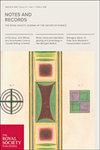国内领域的观察、实验还是自主?1790–1830年英国女性熟悉的科学写作
IF 0.6
3区 哲学
Q3 HISTORY & PHILOSOPHY OF SCIENCE
Notes and Records-The Royal Society Journal of the History of Science
Pub Date : 2017-03-20
DOI:10.1098/rsnr.2016.0018
引用次数: 2
摘要
本文考察了三位选择将自己的教育科学作品与“家庭领域”联系起来的女作家:普里西拉·韦克菲尔德、简·马塞特和玛丽亚·埃奇沃斯。它表明,在现在被广泛归类为“熟悉的科学”的领域中,存在着不同的写作、出版和阅读动机。1790年至1830年间,许多教育家声称,孩子们最好的学习方式是锻炼他们对日常生活中遇到的事情的记忆。宗教信仰、对女性科学教育的态度以及科学在家庭中的实用性有助于解释为什么这些作家选择将他们的书放在似乎限制性的家庭领域,向读者介绍无限的科学世界。此外,本文认为,三位不同的作者设想了微妙不同的国内领域作为他们工作的背景。这些作者所写的并不是妇女和儿童接受教育的单一同质家庭领域,而是教育科学文本类型中描绘的多种家庭领域。本文章由计算机程序翻译,如有差异,请以英文原文为准。
Observation, experiment or autonomy in the domestic sphere? Women's familiar science writing in Britain, 1790–1830
This paper examines three female writers who chose to affiliate their educational scientific works with the ‘domestic sphere’: Priscilla Wakefield, Jane Marcet and Maria Edgeworth. It shows that within what is now broadly categorized as ‘familiar science’, differing motivations for writing, publishing and reading existed. Between 1790 and 1830 many educationalists claimed that the best way for children to learn was for them to exercise their memory on things encountered in everyday life. Religious allegiances, attitudes towards female science education and the utility of science in the home help to explain why these writers chose to introduce their readers to the illimitable world of science by setting their books in the seemingly restrictive domestic sphere. Furthermore, this paper argues that three different authors envisioned subtly different domestic spheres as settings for their work. Rather than there being a single homogeneous domestic sphere in which women and children received their education, and about which such authors wrote, there existed a multiplicity of domestic spheres depicted across the genre of educational science texts.
求助全文
通过发布文献求助,成功后即可免费获取论文全文。
去求助
来源期刊
CiteScore
1.50
自引率
0.00%
发文量
45
审稿时长
>12 weeks
期刊介绍:
Notes and Records is an international journal which publishes original research in the history of science, technology and medicine.
In addition to publishing peer-reviewed research articles in all areas of the history of science, technology and medicine, Notes and Records welcomes other forms of contribution including: research notes elucidating recent archival discoveries (in the collections of the Royal Society and elsewhere); news of research projects and online and other resources of interest to historians; essay reviews, on material relating primarily to the history of the Royal Society; and recollections or autobiographical accounts written by Fellows and others recording important moments in science from the recent past.

 求助内容:
求助内容: 应助结果提醒方式:
应助结果提醒方式:


